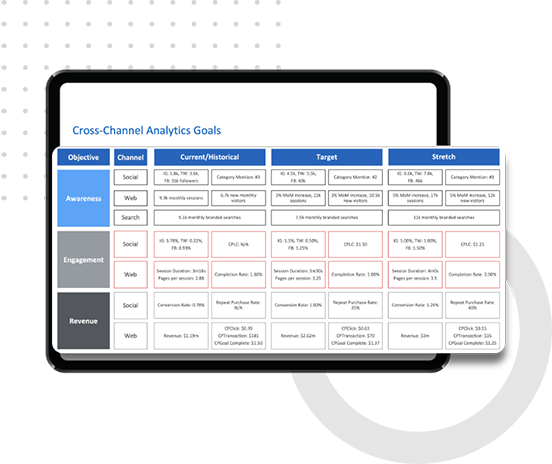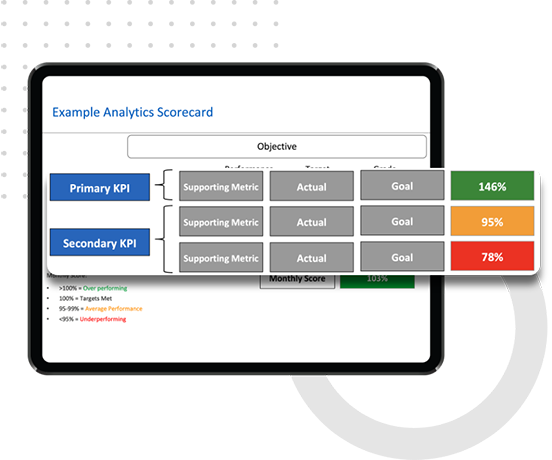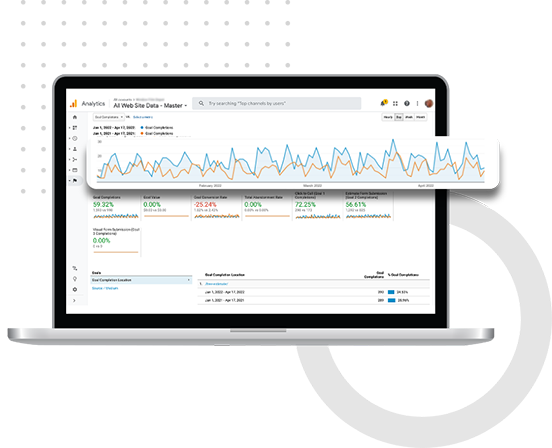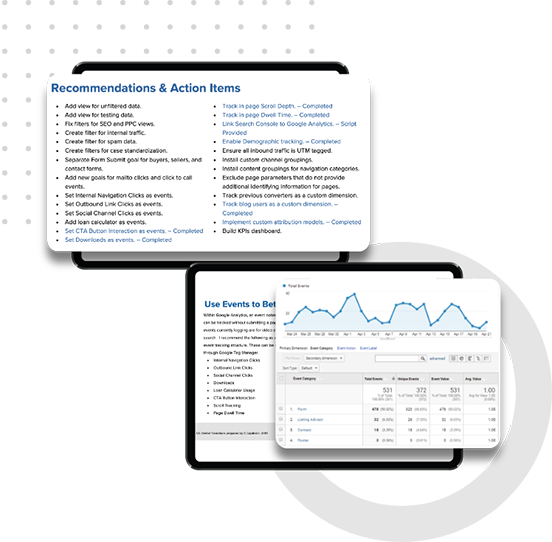Analytics Strategy
Web Marketing KPI & Analytics Tagging Strategy
If you’re not tracking marketing decisions, how will you know what’s working? And perhaps more importantly, where to invest your money? Captivate provides a complete spectrum of custom configuration and data solutions for all types of businesses and brands. Our team works to understand your goals, identifying strategic opportunities for the highest return.
Multichannel & Integrated Marketing Analytics Strategy
Multichannel & Integrated Marketing Analytics Strategy
In business, you don’t put all your eggs in one basket. That same ethos applies to marketing. Successful campaigns take a multichannel approach, designing cohesive and integrated strategies employing SEO, social, email, and content marketing. Our experts craft these services specifically for your brand, knowing what will yield the most efficient results.
- Measure traffic and key actions across each channel and evaluate performance, finding growth opportunities
- Understand who users are and how they interact and engage with content, identifying their tendencies and catering towards their desires
- Configure event tracking and goals to help businesses achieve their digital objectives, utilizing learnings for growth

Define Measurable KPIs to Achieve Business Goals
Define Measurable KPIs to Achieve Business Goals
Goals make things happen. Our team works with your business to create benchmarks and KPIs in order to push business forward. Our transparent and focused strategy offers consistent checkpoints and reporting, working towards measurable data that provides actionable points.
- Monitor conversion goals, events, and KPIs as a point of measurement and performance tracking, providing transparent data focused on growth
- Focus on creating opportunities through information, knowing how to properly interpret data
- Work together to understand short and longterm milestones, consistently checking on progress

Track KPI Goal Metrics with Google Analytics Strategy
Track KPI Goal Metrics with Google Analytics Strategy
Google Analytics may seem simple on the surface, but in order to get the most out of its service, you need experts. Captivate offers robust tracking capabilities, delivering data about your visitors and how they engage with your content. But we don’t just sit on this information. Our analysts provide opportunities — helping your business act with purpose towards your goals.
- Design custom Google Analytics dashboard creation tailored to your KPIs and reporting needs, knowing that each business has its own needs and services
- Run Google Analytics audits that pinpoint misconfiguration, faulty tracking, and flawed data, identifying and plugging any holes in data collection
- Provide experts who know the ins and outs of Google Analytics, bringing seasoned perspective to inform decision making

Align Your Tagging Strategy with an Analytics Audit
Align Your Tagging Strategy with an Analytics Audit
The correct tagging strategy is vital for capturing effective data. Our Atlanta analytics agency will audit your current approach to tracking digital strategy, offering insights on missed opportunities and growth potential. With a few small tweaks, your business could transform. Let us help.
- Effectively leverage analytics data to help instruct digital marketing strategies, prioritizing adjustments as projects grow
- Track visitors and use audience data for remarketing lists and consumer research, understanding the multi-prong attack to marketing
- Bring insight into which channels deliver high marketing value and ROI, focusing on increasing the bottom line

Our Approach to Analytics Tagging Strategy
-

Step 1
EvaluateAssess current-state analytics setup and tracking configuration.
-

Step 2
PlanDevelop a web analytics strategy that aligns with your business’ goals.
-

Step 3
MeasureTrack goals, KPIs, event tracking, and metrics to measure performance.
-

Step 4
DistillOrganize data into actionable intelligence that your business can use.
-

Step 5
LeverageUse findings to instruct digital strategies and optimization improvements.
Web Analytics Strategy FAQs
Every business relies on unique data points. There are, however, a few common KPIs used for any reporting or dashboard setup. Among the most important KPIs in an analytics strategy include:
- Traffic channels (such as organic, paid, direct, social, email, display, and referral)
- User behavior and engagement (average session duration, bounce rate, pages per session)
- Event actions and goal completions (purchases and sales, form inquiries, phone calls, etc.)
Additionally, many businesses use granular data that reflects their visitors and customers, such as geographic and demographic information.
Whether operating a website or an app, digital analytics help improve your venture. In the most simple terms, data analysis helps determine just how successful a marketing campaign is, including why and how an audience interacted with it. The information helps businesses plan their marketing strategies, budgets, content calendars, email blasts, and other initiatives.
First, we need to understand the strategic focus areas and key objectives of the business itself. Once we define these objectives, we identify how to measure the performance of a business’s marketing strategies. We shoot for a combination of goals, like reducing bounce rate, improving sales and conversion rate, and growing traffic from specific channels.
The strategic roadmap behind a business’s marketing plan often directly influences analytics strategy and relevant information. Because no business is the same, analytics strategy requires an acute understanding of a business, its customers, and target maturity levels.
Google Analytics provides an incredibly powerful tool for creating or improving a business’s marketing strategy. By understanding how visitors interact with a site’s or app’s content, marketers can employ optimization strategies to increase engagement, facilitate conversion objectives, and achieve specific goals. Because Google Analytics is a robust, widely universal platform, it seamlessly integrates with other tools like Google Search Console, Google Ads, and AdSense. Custom Google Analytics dashboards let markets efficiently see how well their web properties are performing, and extract valuable intelligence to inform data-driven decisions.
Yes! A Tag Management System like Google Tag Manager offers a cohesive strategy to keep your website in order. An effective TMS allows you to have an understanding of your site’s order and structure. Moreover, TMS can help you gain a handle on tags even when your business goes through transitions, and allows administrators to make changes themselves. In short, keep your house in order, and it’ll stand for a long time.
